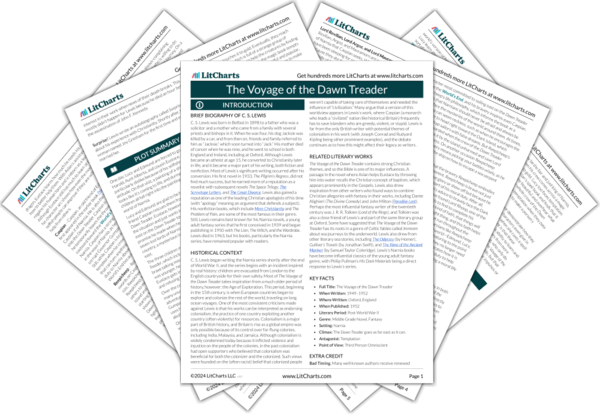The World’s End is a location at the far eastern end of the flat world of Narnia, and it represents the need for faith on life’s journey as well as representing death and the promise of an afterlife. Caspian, Reepicheep, and the others are excited to see the World’s End, even though they don’t know what to expect when they get there. They have heard that Aslan’s country might be near the World’s End and that it seems to be some kind of paradise, but no one knows for sure where Aslan lives. Even the wise Ramandu can offer Caspian few assurances about what he’ll find when he actually reaches the World’s End. And so, the crew of the Dawn Treader lets faith guide them, with Caspian trusting his instincts and Reepicheep believing in a prophecy he heard long ago.
Caspian’s faith in the World’s End helps him find the courage to continue venturing eastward, even as he and his crew face difficult challenges. Ultimately, the crew of the Dawn Treader is rewarded for their faith by the beautiful and strange sights they see near World’s End. In some ways, the journey itself is a reward, as Caspian achieves his goal of finding the seven lost Lords of Narnia, and Edmund, Lucy, and Eustace grow and mature over the course of their journey. The glimpses that the children get of Aslan’s country over the border of the World’s End make it seem like heaven. In this context, Reepicheep’s disappearance from Narnia at the World’s End seems to be a kind of death—but a happy one with the promise of a joyful afterlife. In The Voyage of the Dawn Treader, the World’s End represents the promise of heaven and how faith in eternal life can motivate people to lead better lives and ultimately accept death with dignity.
World’s End Quotes in The Voyage of the Dawn Treader
Where sky and water meet,
Where the waves grow sweet,
Doubt not, Reepicheep,
To find all you seek,
There is the utter East.
At this Gumpas began to pay real attention. “Oh, that’s quite out of the question,” he said. “It is an economic impossibility—er—your Majesty must be joking.”
“Fools!” said the man, stamping his foot with rage. “That is the sort of talk that brought me here, and I’d better have been drowned or never born. Do you hear what I say? This is where dreams—dreams, do you understand—come to life, come real. Not daydreams: dreams.”
“Because,” said the Mouse, “this is a very great adventure, and no danger seems to me so great as that of knowing when I get back to Narnia that I left a mystery behind me through fear.”
“My son,” said the star, “it would be no use, even though you wished it, to sail for the World’s End with men unwilling or men deceived. That is not how great unenchantments are achieved. They must know where they go and why. But who is this broken man you speak of?”
The King took the bucket in both hands, raised it to his lips, sipped, then drank deeply and raised his head. His face was changed. Not only his eyes but everything about him seemed to be brighter.
“Yes,” he said, “it is sweet. That’s real water, that. I’m not sure that it isn’t going to kill me. But it is the death I would have chosen—if I’d known about it till now.”
“What do you mean?” asked Edmund.
“It—it’s like light more than anything else,” said Caspian.
“That is what it is,” said Reepicheep. “Drinkable light. We must be very near the end of the world now.”












